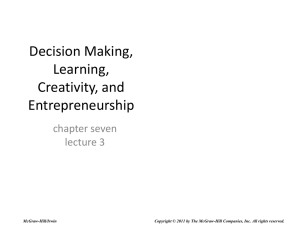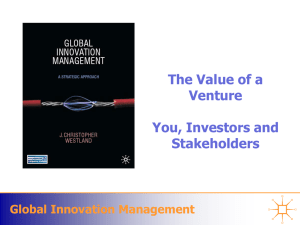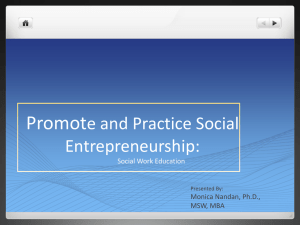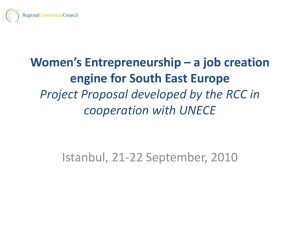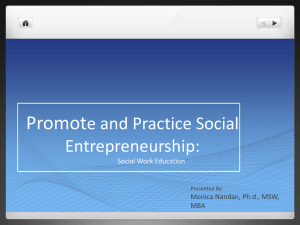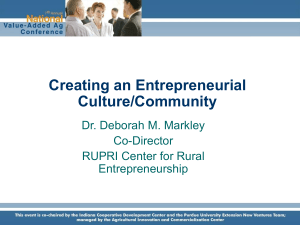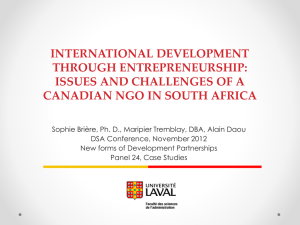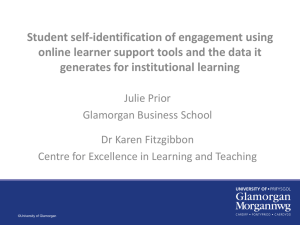Conference presentation Christine Atkinson
advertisement
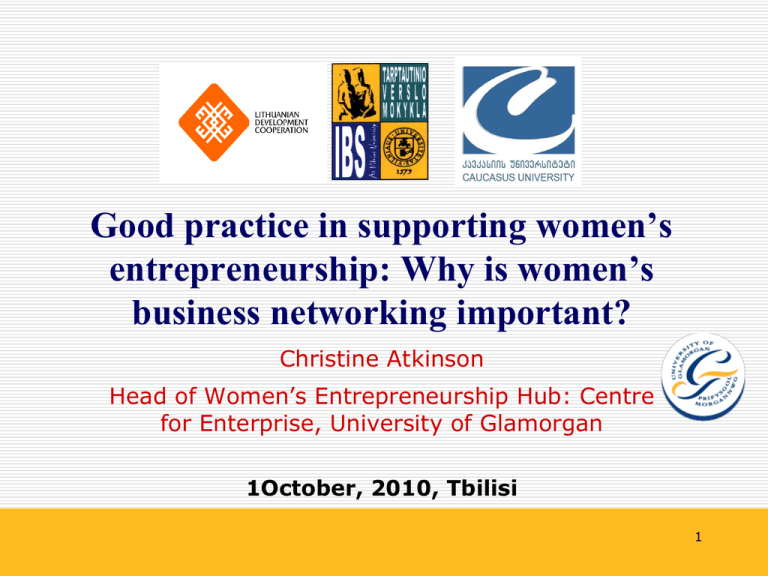
Good practice in supporting women’s entrepreneurship: Why is women’s business networking important? Christine Atkinson Head of Women’s Entrepreneurship Hub: Centre for Enterprise, University of Glamorgan 1October, 2010, Tbilisi 1 University of Glamorgan, Wales Julie Lydon, Vice Chancellor of University of Glamorgan Introduction 1. The Context of Women’s Entrepreneurship 2. Issues facing women entrepreneurs 3. EU Policy Framework 4. Supporting women entrepreneurs at the University of Glamorgan 5. Importance of women’s business networking 1. The context of women’s entrepreneurship Women’s entrepreneurship is increasing in many parts of the world Women are contributing to economic recovery and growth In general, there is still a gender gap in entrepreneurship In Europe, men outnumber women by around 2:1 (more exactly, 18.1% : 9.8%) in entrepreneurship (GEM Global Women’s Report, 2007; Eurostat 2008) 2. Issues facing women entrepreneurs Lack of access to finance Work life balance Stereotypes Information Training Networking (Eurochambres Women Network, 2010) Lack of access to role models Level of optimism Self confidence Fear of failure (GEM Global Women’s Report, 2007) 3. EU Policy Framework The Lisbon Treaty Article 8 (ex Article 3 (2) TEC) (1) In all its activities, the Union shall aim to eliminate inequalities, and to promote equality, between men and women. Article 153 (ex Article 137 TEC) (i) equality between men and women with regard to labour market opportunities and treatment at work. Presented by Birgit Arens, Association of European Chambers of Commerce and Industry Eurochambres Women Network at WEEU Conference 16/9/10 EU Policy Framework continued Europe 2020 1. 75% employment target for 20 – 64 age group 2. 3% GDP investment in R&D (particular focus on private R&D; new indicator for R&D and innovation intensity) 3. 20-20-20 (CO2 possibly 30%) 4. Educational attainment: reduce early drop out rate to 10% and increase in tertiary or equivalent education to 40% of 30-34 age population group 5. Promoting social inclusion, in particular through the reduction of poverty, by aiming to lift at least 20 million people out of the risk of poverty and exclusion Presented by Birgit Arens, Association of European Chambers of Commerce and Industry Eurochambres Women Network at WEEU Conference 16/9/10 EU Policy Framework continued Small Business Act SBA (COM(2008) 394 final) “The EU and Member States shouod create an environment within which entrepreneurs and family businesses can thrive and entrepreneurship is rewarded. They need to care for future entrepreneurs better, in particular by fostering entrepreneurial interest and talent, particularly among young people and women, and by simplifying the conditions for business transfers. The EC will establish an EU network of female entrepreneur ambassadors, promote mentoring schemes to inspire women to set up their own businesses and promote entrepreneurship among women graduates”. Presented by Birgit Arens, Association of European Chambers of Commerce and Industry Eurochambres Women Network at WEEU Conference 16/9/10 4. Supporting women entrepreneurs at the University of Glamorgan Research into personal, business and professional needs of women entrepreneurs, 2000 Kathryn Williams, exstudent ...... MSc Entrepreneurship (Female Entrepreneurs) since 2001 …… now Director of Completely Organised Women’s Entrepreneurship – a Strategic Priority “It is vitally important that we foster entrepreneurship and encourage more women to convert their ability into action.” Jane Hutt, Welsh Assembly Minister for Children, Education, Lifelong Learning and Skills (2008) Launch of Women’s Entrepreneurship Hub, Wales 2008 Political support in Brussels Jill Evans, MEP, 17/6/09 “Currently, women continue to be under represented at senior management level and as proprietors of their own businesses. But when women are given the opportunities to progress in business, they are often the most productive and the most successful in their fields. That is something we should always encourage, but it is particularly relevant as we work to ensure the Welsh economy emerges stronger and more robust from the downturn.” European Launch of Women’s Entrepreneurship Hub, Brussels, 2009 Women’s Entrepreneurship in the European Union (WEEU) New teaching and learning approach and materials Wales, France, Lithuania Universities, Chambers of Commerce, Women owned businesses Focus groups Pilot Women’s Entrepreneurship Summer Schools Pilot mentoring Dissemination events www.weeu.eu 5. Importance of women’s business networking Development of human capital = ‘know how’ Development of social capital = ‘know who’ Information Learning Sharing experiences Power The benefits of networking – ‘a tool for transformation’ Overcome isolation Accessing information Identifying a peer group Access to Mentors Exchanging experiences Peer mentoring Learning informally from one another Getting feedback about the business/products/ services Identifying new customers and suppliers Solving problems A stronger, shared voice Access to power To learn how to deal with sexist attitudes Challenges for women entrepreneurs of networking Reluctance to ‘use’ other people for their own ends Limitations of peer networking/lack of access to power Need for clear idea of objective of the networking relationship, e.g. to achieve a stronger market position, to tender for a larger contract by cooperating with complementary businesses Key considerations in women’s business networking Strong and weak ties Bonding and bridging social capital Relationship Building: Commitment, Trust, Reciprocity … demonstrated over time 4 phases: pre-relationship, exploratory, developing and mature/stable Adaptations and Reputations Women’s more holistic way of doing business What women entrepreneurs say about networking …. “There is, without a doubt, a great difference with how women work in business and how men work. The opportunity to discuss business issues and realise it is okay to work differently is great”. Gail Webb, G & S Training “Three words sum it up for me: motivation, support and encouragement”. Patricia Mears, Designer/Artist
